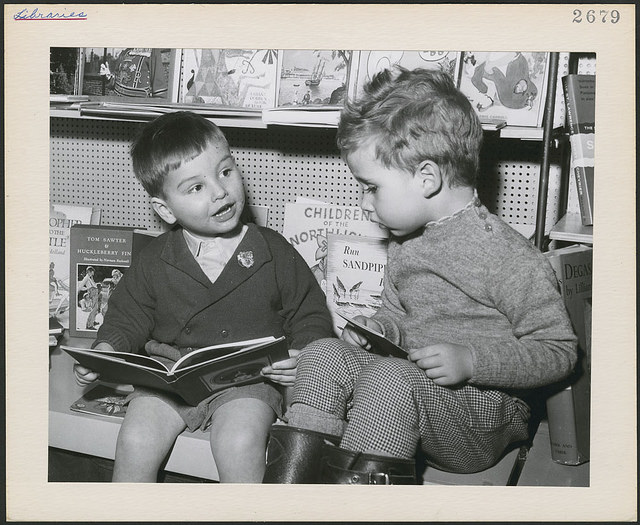Some of my fondest memories of growing up involve stories, often in book form. Literature has the power to stir emotions in people in a way that pure documentary sometimes doesn’t quite achieve.
Reading, we are often forced to break down the sturdy wall between “us and them” and empathize with the plight of other people whose backgrounds are dissimilar to our own.
Childhood is a prime time for setting a strong foundation for adulthood, a period of rapid self-discovery through play and learning. The books our children read and the stories they are exposed to during these years are of paramount importance to the development of their identity and an open-minded mentality.
As a child, I read a lot, and I have included in the following list a number of books that heavily influenced my development or inspired me to think further afield. I have also included books I discovered later in life, which I have passed onto my nieces and nephews and will undoubtedly encourage my children to read.
1) Journey to the River Sea by Eva Ibbotson.
“We all fell on Eva Ibbotson’s perfectly judged, brilliantly light to read, civilised Journey To The River Sea, in which we are shown how, as one of the characters reminds us, ‘Children must lead big lives… if it is in them to do so.’”
~ Anne Fine, British Children’s Laureate
This perfectly sums up Journey to the River Sea, a book which instilled in me a craving for adventure from a young age and inspired me to embark on a trip to the Amazon rainforest years later. Eva Ibbotson transports the reader from a boarding school in early 20th century England to Manaus, the capital city of Amazonia in Brazil. The novel pushes a subtle criticism of the European colonial presence and exploitation in an otherwise beautiful place with a unique indigenous culture.
Young readers are encouraged to develop perspective, empathizing with people from other countries and thinking beyond our backyards. Perhaps this sowed a seed that made me more open to seeing beyond the touristic sights and more interested in social anthropology.
2) How to Live Forever by Colin Thompson.
The detailed illustrations of How to Live Forever never fail to arouse curiosity in young readers, who follow the quest of one child as he seeks a book promising immortality. I remember running my fingers along the colorful pages, searching each crevice of the library in the book for the lost book, and in turn discovering new details I hadn’t noticed the first time. As an adult reader, I look back at the book and still appreciate these beautiful illustrations; I realize that a lot of the satire was lost on me as a child, but this book has multiple layers of understanding, as any good children’s book should.
The conclusion is comforting to those who fear their own mortality and demonstrates the beauty of living a normal life and growing old—a lesson that prepares children for the life they are about to live, and reassures adult readers that everything is going to be okay. Sometimes I forget that I am 24, not 19 anymore, and momentarily panic at the thought that life is going too fast. My mind then wanders back to this book, and I am reminded of the drawbacks of immortality.
3) Milkweed by Jerry Spinelli.
Few words are needed to explain the impact this historical novel, written from the point of view of an orphan Jew living in Nazi-occupied Warsaw, might have on a young reader. Spinelli is talented at instilling empathy in young readers, while inspiring an interest in history and an understanding of the oneness of humanity. Reading about life from the perspective of the unfortunate protagonist, I couldn’t help but reflect on the injustices in the world: Why do some people have such a disadvantageous start in life when others are born into luxury? How was I born in such a comfortable time and place with a loving family when so many people are not?
4) The Hen Who Dreamed She Could Fly by Sun-mi Hwang.
“Whenever she saw the yard hen, Sprout couldn’t stand it—she felt even more confined in her wire cage. She too wanted to dig through the pile of compost with the rooster, walk side by side with him, and sit on her eggs.”
The Hen Who Dreamed She Could Fly came to me by chance recently. Browsing through a bookshop, I admit that I judged the book by its beautifully illustrated cover, which stood out from the rest. After a little online research, I discovered that this book maintained a spot on the bestseller list in South Korea for 10 years after its release in 2000, becoming an instant classic and inspiring one of the highest grossing animated films in Korean history. It’s a children’s book, but that didn’t stop me feeling drawn to it. As if by magic, the book appeared in the pulp book area of the publishing house I was working for the following week, meaning that I could take it for free.
It recounts the story of a thoughtful hen who is tired of her eggs being taken from her, and dreams of escaping from the confines of her chicken coup and hatching one of her eggs. The author has explained that this is actually a metaphorical retelling of her father’s life, which was riddled with struggle. The story emphasizes that even the most far-fetched dreams are worth pursuing, regardless of the odds.
5) If the World Were a Village by David J.Smith.
Anderson famously once described nations as “imagined communities”; we extend empathy, which would usually only reach our kin and close community, to strangers, united by the confines of an arbitrary border. This colorful book is relatable to anyone of any age. Its aim is to promote “world-mindness,” which it achieves by imagining the world’s population, “all 6.8 billion of us,” as a village of just 100 people.
I knew that this was a book I had to buy for my nephew on his birthday. Young readers learn that despite borders and different traditions and customs, the children of the world are not so different from themselves. We are reminded that in an increasingly globalized world, we need to find a way to get along with each other as global citizens.
Happy reading!
~
Relephant Reads:
4 Classic Children’s Books with Spiritual/ Moral Lessons You May Have Missed.
Top 10 Illustrated Kids’ Books Not to Be Missed.
~
Author: Elizabeth Cool
Editor: Toby Israel
Image: BiblioArchives/Flickr
~







Read 2 comments and reply